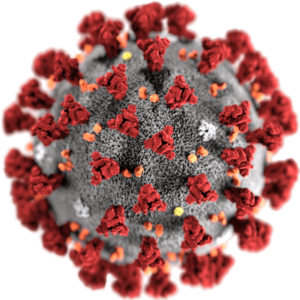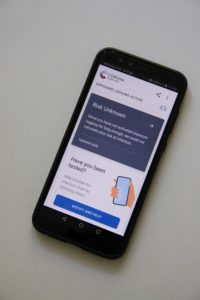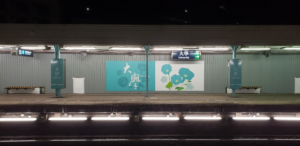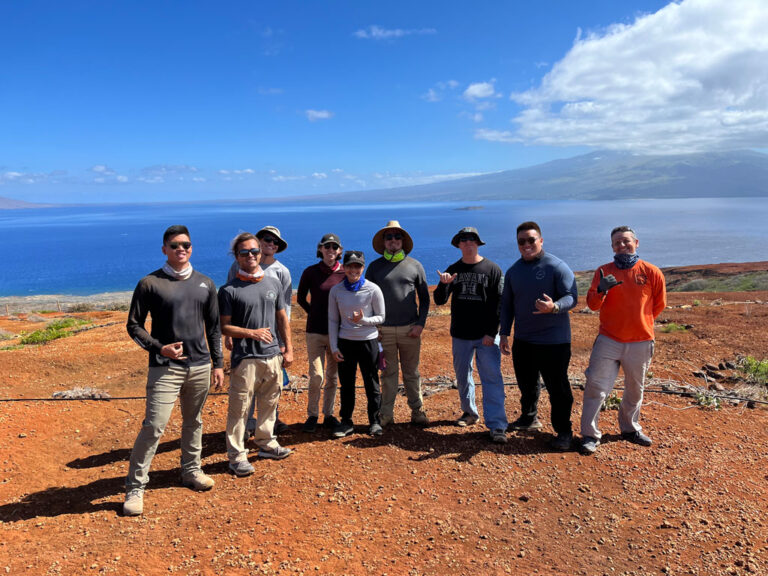Summer Series on questions of Geoethics and Human Rights highlighted by COVID-19 Conditions

By Coline Dony and Emily Fekete
This series developed from discussions that took place at the AAG’s Virtual Annual Meeting, April 6-10, 2020, during publicly available panels of the breaking theme “Geographers Respond to COVID-19”. The panels were set up by AAG specialty groups and their chairs who wanted to initiate discussions about the ongoing pandemic using a geographic lens, showcase the application of geography to urgent issues, and to learn from the evolving circumstances to build future preparedness. Recordings of the panels are still available for anyone to watch.
The discussions raised important, high-stakes questions of ethics and human rights, including ecological-ethical dilemmas of geographical research; access to digital spaces as a vital right; higher education in internet-deserts; the unequal burden of diseases in urban settings; as well as ethics of animal testing for vaccine development. The breaking theme attracted about 1,050 live attendees across the nine panels and an additional 230 views of the panel recordings. As one of the founding members of the AAAS Science and Human Rights Coalition, the AAG is interested in bringing these important discussions to a broader audience.
We invited the panel organizers to write the pieces below to reflect on the ethical and human rights costs of advancing science in times of immediacy, such as COVID-19, when personal geographical data are abundant. We further asked them to reflect on the responsibility of geographers to the public?
‘Slow’ Geographies and Ecological-Ethical Dilemmas of International Research
By Ashley Fent, Joseph Holler, Christine Gibb, Sachiko Ishihara, and Bill Moseley. Sidra Pierson and Hannah Gokaslan contributed editing.
The novel coronavirus spread rapidly into a global pandemic on the heels of unprecedented global social and economic integration—including academic practices of research and education in distant field sites, networking for research collaboration, and dissemination at national and international conferences. In response to COVID-19, governments imposed lockdowns and travel restrictions, fracturing global integration and cancelling plans for field research and academic conferences. Our virtual AAG panel deliberated how geographers may ethically and responsibly sustain climate and development research from home, and the costs of limiting travel on research quality and individual careers.
The pre-COVID status quo of global integration, consumerism, and carbon-intensive capitalism has caused unprecedented global environmental change, increased economic inequality, and disproportionately affected marginalized communities. Geographers are complicit; we have developed long-standing research relationships in vulnerable communities through a global system of unequal mobility, access to resources, and consumption of fossil fuels. Emissions dropped during the pandemic, but economic recovery and stimulus threaten to return us to our pre-COVID collision course with climate change. Scientists and business leaders are calling on us to reject business-as-usual, inventory our value systems and build back a cleaner economy. Corbera and others advocate a new ethics of care in academic professions, echoing the Great Lakes Feminist Geography Collective’s call for slow scholarship.
While our panel shared concerns about the adverse climatic impacts of international travel, we recognized the benefits of being immersed in the communities whose challenges we seek to understand. We shared commitments to physical presence in international field sites for building relationships, serendipitous discoveries, and avoiding pitfalls of disembodied data; but we also recognized an imperative to reconsider our own professional practices. We debated strategies for limiting the ecological costs of our travel-intensive approaches: less frequent but longer research trips, in-country travel by bicycle or public transportation, and substituting in-person conference attendance and fieldwork with remote participation and collaboration.
Strategies to limit ecological costs of academic work also present discriminatory challenges. Longer research trips require substantial funding and time, good health, and freedom from caregiving responsibilities. Students gain valuable international experience facilitated by shorter field visits with faculty supervisors. Successful remote collaboration is easier when it is based on pre-existing in-person relationships, and therefore still requires upfront investments in research travel.
Panel participants raised concerns about neocolonial representations and practices of international fieldwork. The pandemic has highlighted extreme inequalities in health systems, economic relief options, and vulnerabilities within and between nations; yet the near-global travel restrictions have partially and temporarily leveled the playing field among academics usually characterized by highly differential mobilities. Facing the prospect of prolonged restrictions on international travel, we must develop different and more collaborative strategies for maintaining international research programs. These strategies may be less fulfilling or effective for those of us accustomed to hypermobility; however, they also have potential to improve equity in academia and bolster the research capacities and profiles of our academic colleagues in the Global South.
Finally, our panel noted the timeliness of a discussion on slow geographies and addressing ecological-ethical dilemmas of international research during a global pandemic. This forced experiment challenges us to transform our professional practices as geographers.
The discussions and work that contributed to this panel have been published in The Professional Geographer. Fent, A., C. Gibb, S. Ishihara, J. Holler, and W. G. Moseley. 2021. Confronting the Climate Crisis: Slow Geographies and Relational Approaches to International Research.
The Digital Divide and the Right to Safe Internet Access in Times of COVID-19

By Elisabeth Sommerlad and Yossi David
The current coronavirus (COVID-19) crisis highlights the importance of access to the internet in everyday life. During the pandemic, the restrictions on freedom of movement around the world are offset through digital platforms for our basic needs. Interpersonal communication is increasingly taking place in the digital sphere, and the growing importance of digital spaces for the fulfillment of basic needs has become apparent (e.g., food supply, education, information, health care, welfare). However, this argument ignores people affected by digital inequalities. We argue that the COVID-19 crisis is a unique event that reveals various critical aspects that were easier to be disregarded in our previous, so-called “normal” lives. We call for reviewing prior norms and practices, addressing the importance of internet access in times of crisis, and focusing on three key elements of digital spaces: (1) the digital divide could constitute a violation of fundamental (human) rights, (2) the unregulated internet penetration could lead to a violation of the right to privacy and security, especially for vulnerable groups, and (3) the lack of systematic and reliable fact-checking is dangerous to the public, in light of (mis)information distributed by ordinary people and official figures. The observable developments of new digital spaces of flow make us call for a debate on safe internet access as a human right.
We propose not to consider access to information via the internet as a mere privilege. Instead, the current pandemic emphasizes the necessity of accessing vital services and accurate information online. The question arises as to the extent to which (inter)national communities have an obligation to provide their citizens with affordable and stable internet access and to device-based digital media, independent of place of residence or financial resources. While promoting this, it is essential to strengthen the transparency of digital platforms and the responsibility of involved players. This is aimed at establishing neutral and democratic means of media regulation to ensure privacy (e.g. protection of personal data) and cyber security. It is also intended to prevent the abuse of online data as (new) instruments of cyber surveillance and of social media to spread misinformation. When we look at the tensions triggered by the crisis, numerous ethical questions arise, which we should approach from a perspective that combines media geography and communication studies. Times of crisis reinforce social barriers, emphasizing gaps, inequalities, and vulnerabilities. In the context of COVID-19, social inequalities are escalating and tangible new dimensions of digital divide reveal themselves on a global and local level.
The advantages and disadvantages that crises bring to our lives also require a deeper involvement of human geography and media scholars in public and civic policy making. Critical perspectives are essential to ensure full and comprehensive awareness of the different facets of political instructions, increased internet use, and social distancing. We argue that it is part of our duty as academics to take a critical perspective on the different aspects of digital inequality and also to pay attention to the dangers of reducing the importance of ethics under the heading of life-saving measures taken by governments and businesses.
Read a published chapter by David and Sommerland on this topic: Media and Information in Times of Crisis: The Case of the Coronavirus (COVID-19) Infodemic.
More-than-human geographies of COVID-19
By Libby Lunstrum, Stephanie Rutherford, Neel Ahuja, Bruce Braun, Rosemary Collard, and Rebecca W.Y. Wong
As part of the AAG Initiative “Geographers respond to COVID-19,” we examined how more-than-human geographies and study of the wildlife trade can shed light on COVID-19’s roots, routes of transmission, and impacts.
This begins with the need to question and problematize “origin stories,” the discourses that circulate about how pandemics emerge. These origin stories have high stakes, legitimizing certain modes of intervention over others. For example, the narrative that Chinese live animal markets are the roots of the coronavirus’s jump from animal to human is often tinged with an Orientalist gaze and oversimplifies our understanding of COVID-19’s origin, spread, and impact. We must consider these markets and the wildlife trade, but only in their complexity (which uncomfortably implicates Western countries too), the possibility of other points of origin, and the broader intensification of our interactions with animals and non-human environments, including factory farms and habitat disruption. We must also ask what is truly killing us. The latter, for instance, includes systemic discrimination, including poverty and racism, and the austerity measures crippling our early response and healthcare systems.
The wet-market origin story has also led numerous conservation organizations to demand the shutting down of much of the wildlife trade and live animal markets. This carries unforeseen risks from pushing poor rural people dependent on the trade deeper into poverty and pushing the trade itself underground, to amplifying modes of zoonotic security and surveillance that disproportionately target the poor.
Our response to COVID-19 also highlights the ethics and politics of animal testing, in particular test subjects whose lives are sacrificed to find treatments and an eventual vaccine. There are pressing questions surrounding their availability, sacrifice, and care. Every year China exports thousands of monkeys, the most sought-after test subjects, to the US, and it is unclear whether they will be included in the proposed wildlife trade ban, one the US government has resisted on these very grounds. Bringing these “test subjects” into the realm of moral subjects, we must reflect on how to develop an ethical framework that can embrace them as “frontline care workers,” albeit not of their own accord, in ways that foreground their welfare and sacrifice. Here we must shift the lens to look at animals not just as vectors of disease. They are so much more.
Against calls for a return to normalcy and while recognizing the horrific impacts of COVID-19, especially on the already-vulnerable, we have a profound opportunity to rethink our relationships with our economy, political system, each other, and the natural world, including wildlife. We see a need to foreground dignity and protection over efficiency, austerity, and brute nationalism. COVID-19 reveals the political fiction of human exceptionalism and exposes our shared intimacies with the natural world and one another. Our task as critical scholars is to reimagine how we might better live amidst intimacies that are both dangerous and life-giving to both us and our more-than-human counterparts.

Post-Secondary Teaching and Learning in a Pandemic
By Terence Day, I-Chun Catherine Chang, Calvin King Lam Chung, William Doolittle, Jacqueline Housel, Paul McDaniel
COVID-19 forced universities and colleges throughout the world to move classes online. In most cases there was very little time to prepare, but faculty and students confronted the challenge. Courses were completed, and students graduated. Seen through the eyes of some college and university administrations, the transition went surprisingly well. However, looking at things more closely, there were issues, inequities, and unfairness for many students and faculty. And, of course, geography played a role in that, with different infection rates and ability of students and faculty to adapt.
For some students it was easy. Many students appreciated the opportunity to work from home, without the hassle of having to go to campus, or get up early. They could wake up, walk over to their desk, open their laptop, and take their class. However, that assumed the student had a home conducive to work. A 2018 survey found that 36% of university students in the US were housing insecure (Goldrick-Rab et al., 2018). Many of us also assumed that students have laptops. That turned out not to be the case as some students struggled to do exercises on their phones, and maintain wifi connectivity. Their difficulties highlight the social vulnerabilities of people living in internet deserts, as internet access is a lifeline for many, especially those in lockdown areas.
The loss of employment income was an added stressor for many students. COVID-19 related lay-offs and reduced hours of paid employment provoked financial stress. Those who live in areas with a high concentration of businesses related to hospitality and transport, are likely to have been most hard hit. In other cases students worked increased hours due to their status as ‘essential workers’ and also to support the family financially as the collective household income plummeted. Some students were pressured to work in conditions they felt were unsafe. With elementary and high schools closed, families with children at home and no daycare confronted challenges as they tried to study, and look after and educate their children.
Race, ethnicity, and nationality also played a role. Evidence suggests that Black and Latinx populations have higher age-adjusted COVID-19 related mortality rates than the general population (Gross et al., 2020). This impacts Black and Latinx students directly, but also provokes distracting concern about friends and family. There were other issues as well. Students who looked Asian were targeted for abuse based on the perceived Chinese origin of COVID-19. International students had to make hard decisions as borders closed. These same issues impacted faculty, as well as students.
Article 26 of The Universal Declaration of Human Rights states, “… higher education shall be equally accessible to all on the basis of merit”. This means that universities and colleges have an obligation to support ALL their students, and to facilitate ways to overcome the challenges imposed by COVID-19. Universities and colleges must provide enhanced services and accommodations for disadvantaged students, and address inequalities, prejudices, discrimination, disparities, racism and sexism issues in both online and face-to-face learning environments. We suggest that universities and colleges undertake student and faculty surveys throughout the coming year and adapt institutional policies for local circumstances.
A paper on this topic has been published in The Professional Geographer. Terence Day, I-Chun Catherine Chang, Calvin King Lam Chung, William Doolittle, Jacqueline Housel, Paul McDaniel. The Immediate Impact of COVID-19 on Postsecondary Teaching and Learning.
The City at Risk: Urban Geographers Respond to COVID-19
By Richard D. Quodomine, Dayne Walling, Augusta Wilson, Eric Hoffman, Michael J. Allen, Ian Purcell, Toni Castro-Cosio, and Hannah Torres
In April of 2020, Urban Geographers from the academic and practicing sides of the discipline came together to begin to assess and address the public, social, economic, and scientific challenges apparent in the early stage of the pandemic because of how adversely, and disproportionately, COVID-19 had impacted several populations and institutions linked to urban environments. While the most serious outbreaks had occurred in places with large population sizes and high densities, such as in New York City, Chicago, and New Orleans, and clusters can theoretically appear anywhere, several other urban area characteristics and spatial factors of systems, such as mobility of wealthy suburban cohorts, mass transit patterns, locations of municipally supported housing, concentrations of poverty, immigration networks and status, air quality attainment, aging water infrastructure, occupational and industrial growth sector mismatch, and fragmented government authority, compound negative public health effects and complicate effective response.
The multi-faceted and multi-scalar demands of responding to the pandemic are immense in every urban area. In Philadelphia, for example, 53 percent of Philadelphia’s COVID-19 fatal cases were in prisons, senior living facilities or similar protective quarters, many of which are municipal facilities. The schools have been closed, but as that is also the source of nutrition for many young people, school food services have had to remain open and attempt to serve in creative ways. Providing access to instruction has meant the rapid deployment of a laptop loaner program and discount high speed internet rolled out to upwards of 50,000 students.
The COVID-19 outbreak has also overlapped with existing and long-term patterns of disinvestment, imposed austerity and fiscal distress, which limit resources delivered to communities that need them most. The tax base of central and older cities has been reduced through federal and state public policy decisions in recent decades. In Detroit, Michigan’s largest city, the virus had an early severe effect. This is part of a trend where the state retains a greater share of public revenues leaving cities with less funding for essential services than fifteen years ago. Additionally, revenues from many local sales and business taxes are significantly reduced. Drops in transit ridership not only worsen bottom lines but potentially impact local shares of capital projects and jeopardize the receipt of future matching federal and state funds. Cities operate as hubs for regional activities, transportation, medicine and government, and their ability to be that is heavily impacted by the pandemic.
Serious scientific questions remain about how COVID-19 is manifesting and intersecting with environmental, racial, and medical justice issues. Due to historical inequality, urban areas have seen this disparity has recently come into stark view with the Black Lives Matter protests. While seen as primarily in opposition to potentially racist or overly violent police tactics, there is as much concern over how people of color are treated in health and social services. In many areas, those attainment areas have higher vulnerable populations, including lower income, people of color, aging populations and people with disabilities, resulting in higher mortality or long-term morbidities in their resident populations. Public health, policing and other policies must help guide equitable recovery and pay keen attention to the challenges confronting urban areas that have created deeply disparate effects and outcomes.
Going forward, studies will be necessary to determine COVID-19 impacts on Urban spaces. Possibly more importantly, the impacts of the recovery efforts, in terms of return on investment and the equity of those investments as they impact many impacted populations of color, LGBTQ status, and incomes.
Participatory Forum on New Requirements for Ethical Geographic Science in Rapid Research
To continue the discussion of questions that have been developed throughout both the AAG Annual Meeting Breaking Theme sessions and this Summer Series, please join us in a participatory forum on October 1, 2020. Click here to register and for more information.
DOI: 10.14433/2017.0075


